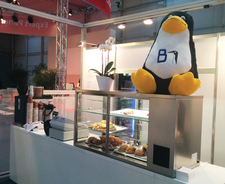Doghouse – Happy Anniversary
Many Happy Returns

"maddog" remembers 20 years of association with Linux, CeBIT, and open source.
I am writing this on the floor of CeBIT, the world's largest computer and telephony trade show. I am sitting in the booth of Medialinx, the parent company of Linux Magazine and various other "open source" magazines. I see from their posters that this year is the 20th anniversary of their flagship publication Linux Magazine, and I realize it is also the 20th anniversary of my involvement with the Linux project, because I met Linus Torvalds in May 1994.
I remember the first time I came to CeBIT. In those days, there was a waiting list to get floor space at the CeBIT show, and "first year" companies did not have a chance for even the smallest booth on the show floor. Linux International had a small booth in a "USA" pavilion, and except for the SUSE booth in another hall, we were the only visible "Linux" booth. The booth was shared by a fledgling Red Hat Software (represented by Bob Young), Caldera Software (represented by Ransom Love), and myself. We were handing out free CDs of Red Hat, Caldera, and (after they brought the CDs over) SUSE to anyone who asked for them.
During the first year I was at CeBIT, two other companies also carried the Linux flag, however. One was SAP, the largest software company in Germany, who liked GNU/Linux as a platform, and the other was an Israeli company called "Magic Software."
[...]
Buy this article as PDF
(incl. VAT)
Buy Linux Magazine
Subscribe to our Linux Newsletters
Find Linux and Open Source Jobs
Subscribe to our ADMIN Newsletters
Support Our Work
Linux Magazine content is made possible with support from readers like you. Please consider contributing when you’ve found an article to be beneficial.

News
-
Debian Unleashes Debian Libre Live
Debian Libre Live keeps your machine free of proprietary software.
-
Valve Announces Pending Release of Steam Machine
Shout it to the heavens: Steam Machine, powered by Linux, is set to arrive in 2026.
-
Happy Birthday, ADMIN Magazine!
ADMIN is celebrating its 15th anniversary with issue #90.
-
Another Linux Malware Discovered
Russian hackers use Hyper-V to hide malware within Linux virtual machines.
-
TUXEDO Computers Announces a New InfinityBook
TUXEDO Computers is at it again with a new InfinityBook that will meet your professional and gaming needs.
-
SUSE Dives into the Agentic AI Pool
SUSE becomes the first open source company to adopt agentic AI with SUSE Enterprise Linux 16.
-
Linux Now Runs Most Windows Games
The latest data shows that nearly 90 percent of Windows games can be played on Linux.
-
Fedora 43 Has Finally Landed
The Fedora Linux developers have announced their latest release, Fedora 43.
-
KDE Unleashes Plasma 6.5
The Plasma 6.5 desktop environment is now available with new features, improvements, and the usual bug fixes.
-
Xubuntu Site Possibly Hacked
It appears that the Xubuntu site was hacked and briefly served up a malicious ZIP file from its download page.

